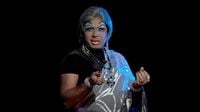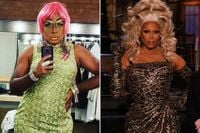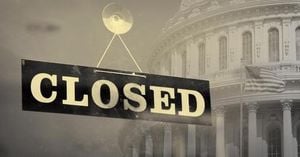Harvard University, long regarded as the pinnacle of academic tradition and prestige, has found itself at the center of a swirling debate after announcing the appointment of Kareem Khubchandani—better known by the drag persona LaWhore Vagistan—as the 2025-26 F.O. Matthiessen Visiting Associate Professor of Gender and Sexuality Studies. The news, confirmed by Harvard in early October 2025, has ignited both praise and criticism, shining a spotlight on evolving academic priorities, cultural shifts, and the ongoing culture wars that have gripped American higher education.
Khubchandani, who hails from Tufts University and specializes in performance studies, queer studies, and South Asian studies, is no stranger to blending scholarship with performance art. Under the flamboyant moniker LaWhore Vagistan, Khubchandani will teach two courses: “Queer Ethnography” in the fall semester and “RuPaulitics: Drag, Race and Desire” in the spring. According to The Economic Times, the latter class draws inspiration from the hit television show RuPaul’s Drag Race and promises to explore intersections of drag, race, and desire, while the former delves into the lived realities and cultural dynamics of queer communities.
Harvard’s decision to bring Khubchandani on board was met with a warm welcome from the university’s Gender and Sexuality Caucus, which expressed support for the appointment in a July 2025 message. The university’s press release highlighted Khubchandani’s impressive academic pedigree, including a PhD in performance studies from Northwestern University and a BA in sociology and anthropology from Colgate University. In addition to teaching, Khubchandani is the author of several notable works, including Ishtyle: Accenting Gay Indian Nightlife—a performance-ethnographic study of queer nightlife in Chicago and Bangalore—and the forthcoming Lessons in Drag: A Queer Manual for Academics, Artists, and Aunties, set for release in October 2025.
Yet, as with many cultural milestones in recent years, the appointment quickly became a flashpoint for criticism and online debate. Social media lit up with voices from across the ideological spectrum. Sarah Perry, vice president and legal fellow at Defending Education, took to X (formerly Twitter) to deride Harvard as a “joke” for hiring an Indian drag queen as a visiting professor. Perry’s criticism focused on the perceived academic frivolity of courses centered on drag performance, arguing that such offerings signal a departure from the university’s historic rigor.
Conservative media outlets and commentators also weighed in, with some finding the news “incredibly funny” and even double-checking to ensure the story wasn’t a parody. According to Fox News, right-wing commentators described the classes as more fitting for a community center than for Harvard, once known for its academic excellence. Others, like the hosts of Just Questions Radio, suggested that Harvard’s reputation was in “freefall,” and questioned the value of courses on drag and queer ethnography, especially in the wake of broader debates about the purpose and direction of higher education.
But the criticism has not been purely ideological. Some detractors argued that the focus on drag performance in an academic setting reflects a broader trend of “wokification” and self-indulgence in elite universities, pointing to recent controversies at Harvard and other institutions. “The real lesson of Vagistan’s class has nothing to do with drag, nightlife or globalization: It reinforces that it was a grave mistake to allow a generation of race and gender studies graduates to export their campus culture to the corporate world over the last decade,” one columnist remarked in New York Post.
Khubchandani, for their part, has been candid and playful about the origins of the LaWhore Vagistan persona. In a 2015 interview with Johns Hopkins University Press, Khubchandani explained, “My name is LaWhore Vagistan, my preferred pronouns are ‘she’ or ‘aunty.’ I chose ‘LaWhore’ because my family traces its origins to Pakistan: Lahore is an important city in Pakistan, and well, I’m a bit of a whore. And Vagistan because I see the subcontinent as one, big, beautiful Vag…istan. Close your eyes and visualize it: India is the uterus-vagina, Pakistan and Bangladesh are the ovaries, Afghanistan, Nepal, Burma, and Bhutan are the fallopian tubes, and Sri Lanka is a little floating labia.” The quote, which went viral after Harvard’s announcement, encapsulates Khubchandani’s blend of humor, provocation, and cultural commentary.
Performance is central to Khubchandani’s teaching and scholarship. As reported by Fox News and The Georgetown Independent, Khubchandani’s alter ego has graced stages at universities across the country. In February 2024, LaWhore Vagistan delivered a performance lecture titled “Lessons in Drag” at Georgetown University, part of the South Asia Speaker Series. The act, which mixed lipsyncs to pop divas with recordings of South Asian children at spelling bees, touched on themes of globalization, feminist theory, and Islamophobia. At Williams College in April 2024, the show was described as a “transnational approach to drag,” highlighting the extra work required of queer South Asian immigrants to fit into nightlife scenes—everything from shaving nose hairs to hitting the gym.
Despite the uproar, Harvard has stood by its decision. The university’s Gender and Sexuality Caucus reiterated their support, emphasizing the value of diverse perspectives and interdisciplinary approaches in academia. Khubchandani’s courses, which combine performance, theory, and lived experience, are seen by supporters as vital contributions to contemporary scholarship on gender, race, and sexuality.
The timing of the appointment has also raised eyebrows, coming on the heels of former President Trump’s decision to unfreeze $2.4 billion in federal grants to Harvard, contingent on the university establishing new trade schools. As noted by The Economic Times and New York Post, the juxtaposition of renewed federal support for vocational training and the hiring of a drag queen professor underscores tensions between funding priorities and academic freedom.
Amid the noise, Khubchandani’s academic credentials and creative output remain undeniable. With a PhD from Northwestern and a growing list of publications, Khubchandani’s work bridges the worlds of scholarship and performance, offering students a chance to engage with critical race, postcolonial, and gender theory in unconventional ways. As Harvard’s announcement makes clear, the university is betting that such innovation is not only compatible with its storied legacy but essential to its future.
For all the controversy, the arrival of LaWhore Vagistan at Harvard is a vivid illustration of the changing face of higher education—one where tradition and transformation collide, and where debates about identity, scholarship, and society are played out as much on stage as in the classroom.






